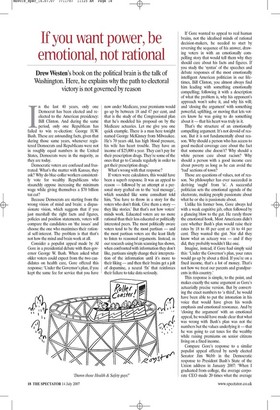If you want power, be emotional, not rational
Drew Westen's book on the political brain is the talk of Washington. Here, he explains why the path to electoral victory is not governed by reason 1 n the last 40 years, only one Democrat has been elected and reelected to the American presidency: Bill Clinton. And during the same period, only one Republican has failed to win re-election: George H.W. Bush. These are astounding facts, given that during those same years, whenever registered Democrats and Republicans were not in roughly equal numbers in the United States, Democrats were in the majority, as they are today.
Democratic voters are confused and frustrated. What's the matter with Kansas, they ask? Why do blue-collar workers consistently vote for wealthy Republicans who staunchly oppose increasing the minimum wage while giving themselves a $70 billion tax cut?
Because Democrats are starting from the wrong vision of mind and brain: a dispassionate vision, which suggests that if you just marshall the right facts and figures, policies and position statements, voters will compare the candidates on `the issues' and choose the one who maximises their rational self-interest. The problem is that that's not how the mind and brain work at all.
Consider a populist appeal made by Al Gore in a presidential debate with then-governor George W. Bush. When asked what older voters could expect from the two candidates on health care, Gore offered this response: 'Under the Governor's plan, if you kept the same fee for service that you have now under Medicare, your premiums would go up by between 18 and 47 per cent, and that is the study of the Congressional plan that he's modeled his proposal on by the Medicare actuaries. Let me give you one quick example. There is a man here tonight named George McKinney from Milwaukee. He's 70 years old, has high blood pressure, his wife has heart trouble. They have an income of $25,000 a year. They can't pay for their prescription drugs. They're some of the ones that go to Canada regularly in order to get their prescription drugs.'
What's wrong with that response?
If voters were calculators, this would have been a superb response. It was an appeal to reason — followed by an attempt at a personal story grafted on to the 'real message', which sounded like some consultant told him, 'You have to throw in a story for the voters who don't think. Give them a story — they like stories.' But that's not how voters' minds work. Educated voters are no more rational than their less educated or politically interested peers. The most politically aware voters tend to be the most partisan — and the most partisan voters are the least likely to listen to reasoned arguments. Instead, as our research using brain scanning has shown, when confronted with information they don't like, partisans simply change their interpretation of the information until it's more to their liking — and then their brains get a jolt of dopamine, a neural `fix' that reinforces their failure to take data seriously.
If Gore wanted to appeal to real human brains, not the idealised minds of rational decision-makers, he needed to start by reversing the sequence of his answer, drawing voters in with an emotionally compelling story that would tell them why they should care about his facts and figures. If you study the 'syntax' of the speeches and debate responses of the most emotionally intelligent American politician in our lifetimes, Bill Clinton, you almost always find him leading with something emotionally compelling; following it with a description of what the problem is, why his opponent's approach won't solve it, and why his will; and 'closing the argument' with something powerful, uplifting, or moving that lets voters know he was going to do something about it — that his heart was truly in it.
That's the structure of an emotionally compelling argument. It's not devoid of reason. But it is not fundamentally about reason. Why should a person who has access to good medical coverage care about the fact that someone else doesn't? Why should a white person care about racism? Why should a person with a good income care about poverty as long as he can avoid the 'bad' sections of town?
Those are questions of values, not of reason. No philosopher has ever succeeded in deriving 'ought' from 'is'. A successful politician sets the emotional agenda of the electorate, making people passionate about what he or she is passionate about.
Unlike his former boss, Gore always led with a weak cognitive jab, often followed by a glancing blow to the gut. He rarely threw the emotional hook. Most Americans didn't care whether Bush's plan would raise their rates by 18 to 48 per cent or 16 to 44 per cent. They wanted the gist. Nor did they know what an actuary was — and if they did, they probably wouldn't like one.
Imagine, instead, if Gore had simply said this: 'Under the Governor's plan, your rates would go up by about a third. If you're on a fixed income, that's a lot of money. That's not how we treat our parents and grandparents in this country.'
This response is simple, to the point, and makes exactly the same argument as Gore's actuarially precise version. But by converting the exact numbers to 'a third', he would have been able to put the intonation in his voice that would have given his words emphasis and emotional resonance. And by 'closing the argument' with an emotional appeal, he would have made clear that what was wrong with Bush's plan was not the numbers but the values underlying it — that he was going to cut taxes for the wealthy while raising premiums on senior citizens living on a fixed income.
Compare Gore's response to a similar populist appeal offered by newly elected Senator Jim Webb in the Democratic response to President Bush's State of the Union address in January 2007: 'When I graduated from college, the average corporate CEO made 20 times what the average worker did; today, it's nearly 400 times. In other words, it takes the average worker more than a year to make the money that his or her boss makes in one day.'
Webb was using numbers, just like Gore was. But they were at the service of eliciting a feeling — moral outrage — and a value — fairness. You can't read those two simple sentences without immediately thinking, 'That's just not right' or 'That isn't fair'. Unless you're working overtime to avoid them, those feelings are the natural emotional entailment of the 'argument'.
I do not mean to single out Al Gore here. He is the person most responsible for making the entire world take seriously the climate change that is threatening our planet. But he didn't succeed in doing that primarily by regaling us with facts and figures. He'd marshaled those years earlier, and all the facts in the world didn't stop George W. Bush from discarding everything we knew. Gore set the emotional agenda with his brilliant movie, An Inconvenient Truth, which allowed us literally to see the polar ice caps melting and the glaciers toppling before our eyes. And he used language in that movie in a way he never used it in the election of 2000, reminding us that 'This is our only home'.
In America, what allowed George Bush to reject the Kyoto Treaty and set the clock back a decade in dealing with one of the greatest dangers to the world we leave our children was not just the greed, indifference, smugness and hubris of a President and party who didn't think facts mattered to good governance. It was also the irrational commitment to rationality of the left. Behind every reasoned decision is a reason for deciding. We do not pay attention to arguments unless they engender our interest, enthusiasm, fear, anger or contempt. We are not moved by leaders with whom we do not feel an emotional resonance. We do not find policies worth debating if they don't touch on the emotional implications for ourselves, our families, or the things about which we care most deeply.
The political brain is an emotional brain, not a calculator.
Drew Westen, Ph.D., is professor of psychology and psychiatry at Emory University and founder of Westen Strategies. He is the author of The Political Brain: The Role of Emotion in Deciding the Fate of the Nation, published by PublicAffairs Books.


















































 Previous page
Previous page